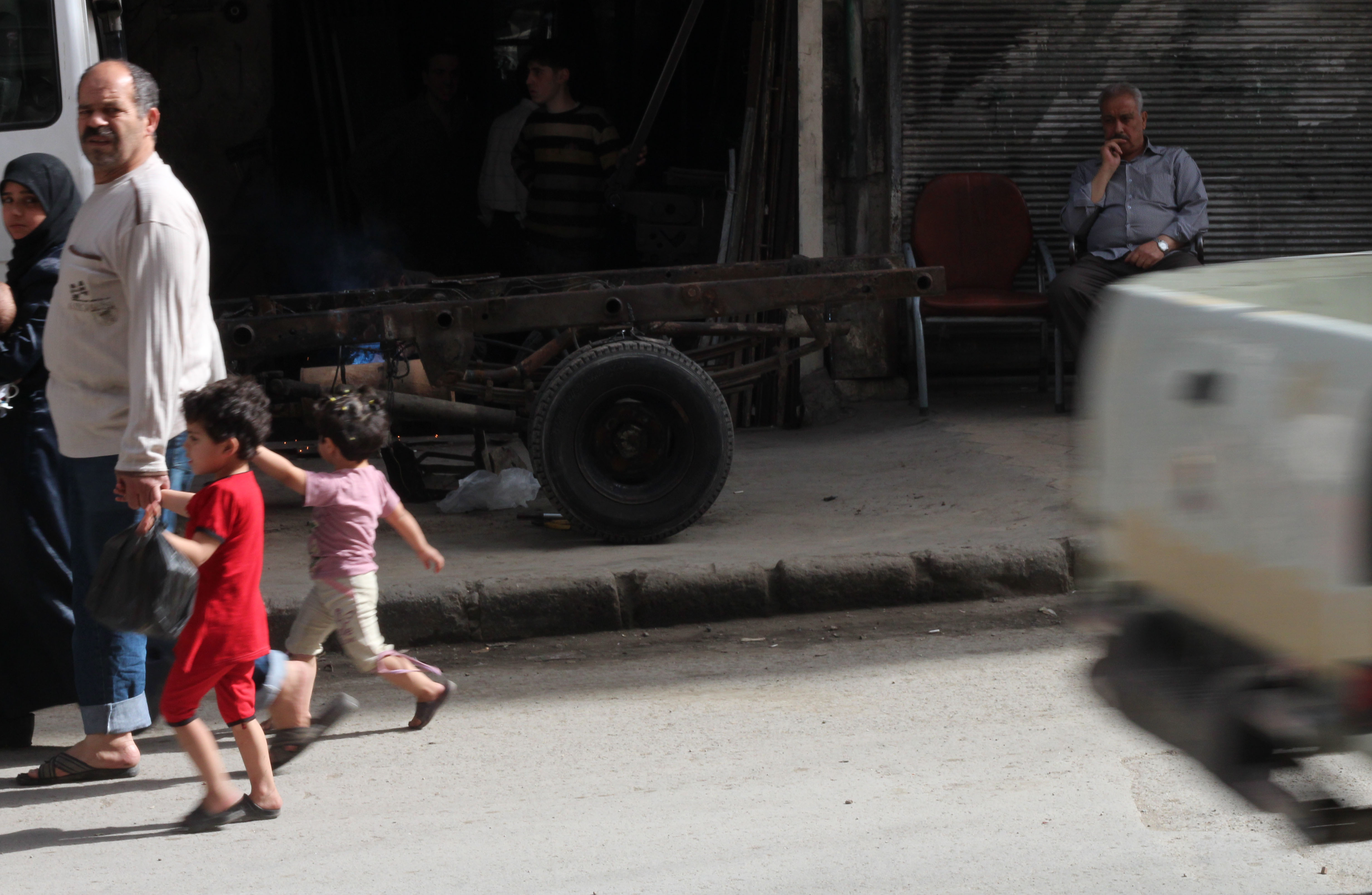Darkness and Tyranny in Kafr Nabl

Life goes on for this family despite the constant bombardment of their al-Maadi neighbourhood in Aleppo. Photo: Salah al-Achkar
In March 2011, a few days after demonstrations began in Daraa governorate, my own city of Kafr Nabl started witnessing its own protests calling for freedom and dignity. About two weeks later, demonstrators began demanding the fall of the regime. Finally, on the morning of July 4, 2011, Bashar al-Assad’s army entered Kafr Nabl in an attempt to put a stop to the city’s revolution.
That day the men, women and children of Kafr Nabl witnessed the atrocities Assad’s forces would carry out when confronted with civilians.
The incursion came from three directions with heavy gun and sniper fire aimed at people’s homes.
My own curiosity pushed me to go up to the roof of our house and watch what was happening around us. Tanks and armoured vehicles filled the city streets. One of the soldiers yelled at me, “Go downstairs! Downstairs quickly.”
And so I rushed away.
My younger siblings and I were terrified and perplexed; we didn’t know what was happening or what we should do. Even my mother and father were scared and confused, especially after people began spreading the news or rumour that soldiers were raping the female supporters of the revolution.
Many families had already escaped. My parents agreed to move from the city to one of the nearby villages. But it was too late; no one could leave their house, that’s what Assad’s soldiers had decided.
Soldiers were stationed atop the city’s highest buildings and had seized the government centres such as the post office, the municipality, the Baath party building and the state-owned carpet factory. They also controlled the city hospitals.
In those days, most of the rebels were unarmed and calling for peace. So they retreated and fled to hide in orchards and nearby villages.
An hour or two after the incursion began, the firing began to calm down. The soldiers started to search houses. They entered ours but didn’t approach anyone; they only randomly looked through rooms and the furniture and then left.
They took whatever they wanted from houses abandoned by their owners, claiming they were houses of terrorists or of American, Qatari or Saudi agents.
They also arrested some youths and burned some motorcycles. Most of the detainees were released some days later after the regime authorities had determined that they weren’t rebels or supporters of the revolution. The authorities still managed to torture them in a variety of ways during this investigation.
Two months after the army incursion, schools opened their doors again. My family returned to the Damascus countryside for my father’s work, while I stayed in Kafr Nabl to continue my studies in grade nine. This period coincided with the beginning of the armed resistance by the city’s rebels who started clashing with the army. The rebels would retreat after each confrontation, allowing the soldiers to pour their rage out on unarmed civilians. They would take revenge by arresting and torturing people or burning property such as cars or shops.
One day, while I was going to school after a clash between rebels and the army, a soldier pointed his gun at me and fired. That bullet could have killed me in seconds. However, by some miracle I survived; the bullets hit the walls of a nearby house instead.
I sought shelter in a neighbouring house until the situation had stabilised and i could return home.
I didn’t tell any of my relatives what had happened so that they wouldn’t stop me going to school.
In August 2012 the rebels freed my city from Assad’s soldiers after a bloody five-day battle. That day was one of the happiest of my life. I thought that we were freed forever and we that would have the country we wanted. But the reality was different.
Armed groups currently fight over Kafr Nabl, some of them support the revolution and others don’t recognize it but instead have adopted an extremist ideology hostile to freedom, civilization and democracy.
My city of Kafr Nbal is not yet liberated from darkness and tyranny.
Basma al-Hasan, 18, is a high school student who moved with her family from Damascus’s countryside to Kafr Nabl at the beginning of the revolution. She still lives there.
You can read the Arabic version of the article here.
